SLAMDANCE 2012: A ROUNDTABLE DISCUSSION
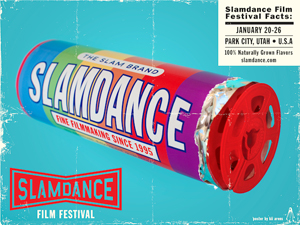 On Day Six of Slamdance 2012, I got together with the creators of three of the festival’s most interesting and challenging films: Frank Rinaldi (writer/director) and Scott Laidlaw (editor) from Sundowning; Daniel Martinico (director/co-writer) and Hugo Armstrong (actor/co-writer) from OK, Good, and Peter McLarnan (writer/director) and Brennan Vance (DP) from The Sound of Small Things. We gathered around a tiny bar table in the Carhartt Lounge at the Treasure Mountain Inn to discuss the past and future of movies, whether their films are actually avant-garde, what art is and what is art, rigor, and drawing the perfect bath.
On Day Six of Slamdance 2012, I got together with the creators of three of the festival’s most interesting and challenging films: Frank Rinaldi (writer/director) and Scott Laidlaw (editor) from Sundowning; Daniel Martinico (director/co-writer) and Hugo Armstrong (actor/co-writer) from OK, Good, and Peter McLarnan (writer/director) and Brennan Vance (DP) from The Sound of Small Things. We gathered around a tiny bar table in the Carhartt Lounge at the Treasure Mountain Inn to discuss the past and future of movies, whether their films are actually avant-garde, what art is and what is art, rigor, and drawing the perfect bath.
Hammer To Nail: I guess the departure point, for me, for this conversation, was what happened in The Sound of Small Things Q&A when Peter McLarnan was talking about being a fine artist and trying to apply the same sort of rigor you apply to a fine art piece to a film, but to somehow have it become pertinent or workable for a wider audience, and Frank Rinaldi jumped in and, if I’m not mistaken, was like “Is that possible?” and was quite strong in the way he asked the question. So I wonder if you guys want to talk more about that just to get started. I think in a larger sense I’d like to discuss what’s been coming up in your films collectively—I know you haven’t all seen each other’s films but both the aesthetic and the intention behind the kind of films that you’re making and possibly what’s happening in this kind of collective consciousness that’s giving rise to these kinds of films.
Peter McLarnan: I mean that’s something that we always—Brennan the DP and I met in college and we really bonded over that question, and that’s how we connected with each other and started working with each other. This film is by far the most conventional thing I’ve ever made. First piece with dialogue, first piece with any kind of conventional narrative qualities to it, so I think using the relationship drama, which I think is something that’s really familiar and really comfortable for a lot of people, as an access point or as an entry point, to then allow for everything else to kind of function on top of that, so it’s the relationship that serves as the kind of structure so you can then build all this sort of cinema or conceptual components on top of. So that’s really what we were trying to do, but then, as you get into it you also have to commit to it, so that it’s not super-cold or it’s not like, just an exercise; you have to commit to the relationship and commit to the characters and commit to the narrative even though initially that wasn’t really anything I was interested in. But I think for me that’s what I liked about working on [The Sound of Small Things]: what I discovered by actually coming from outside a convention and finding yourself embracing it.
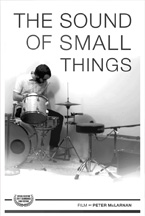 Frank Rinaldi: You have an interesting point; I think when you look at the kinds of films that we seem to be making the narrative is an entry point for an audience, right? And I think what’s interesting with you guys, both of you guys, The Sound of Small Things and OK, Good, you guys are coming from fine arts backgrounds and coming around full circle to narrative storytelling, and with us our background is more conventional narrative storytelling, but having seen a lot of movies and a sort of a thirst or a hunger for new filmic experiences, we’re kind of like pushing it more toward the fine art realm. But I think what’s really important in this experiment that we all seem to be embarking on is that we recognize the importance of narrative, because, like I said before, that allows a point of access, but we’re also pulling ideas from other fields, other areas, to facilitate that narrative and provide new kinds of experiences that you don’t usually get—new visual experiences, new sound experiences, cinematic experiences that you don’t usually get in a more conventional film. Oftentimes I think that asks or requires more work from the audience, but I feel that it can result in a more rewarding experience, a more fulfilling experience and, you know, we watch a lot of movies and we wanna see new kinds of movies, and that’s important.
Frank Rinaldi: You have an interesting point; I think when you look at the kinds of films that we seem to be making the narrative is an entry point for an audience, right? And I think what’s interesting with you guys, both of you guys, The Sound of Small Things and OK, Good, you guys are coming from fine arts backgrounds and coming around full circle to narrative storytelling, and with us our background is more conventional narrative storytelling, but having seen a lot of movies and a sort of a thirst or a hunger for new filmic experiences, we’re kind of like pushing it more toward the fine art realm. But I think what’s really important in this experiment that we all seem to be embarking on is that we recognize the importance of narrative, because, like I said before, that allows a point of access, but we’re also pulling ideas from other fields, other areas, to facilitate that narrative and provide new kinds of experiences that you don’t usually get—new visual experiences, new sound experiences, cinematic experiences that you don’t usually get in a more conventional film. Oftentimes I think that asks or requires more work from the audience, but I feel that it can result in a more rewarding experience, a more fulfilling experience and, you know, we watch a lot of movies and we wanna see new kinds of movies, and that’s important.
Daniel Martinico: Yeah, I mean it’s interesting because for me the starting place was pretty similar to the way that I would start a video piece, and pretty much the big shift is that a lot of the video work I was doing before was really insular, autonomous, very one-person-in-a-room-with-material, over a very long time or a short period of time, just sort of obsessing over it. And the kind of additional piece this time—I mean it’s been there for a long time with Hugo and I, but compared to say the video work that I was doing before—was the element of collaboration. I mean I still love that kind of holing up and disappearing into stuff by yourself, but this is something that was kind of missing from that for me. But in terms of the process, the end result we were working towards was the same end result that I think of working toward with a piece: that first and foremost it’s for yourself. And so first and foremost this was for us and we never actually thought of narrative as a way of making it accessible to an audience; it was just a way to kind of fold in new ideas.
H2N: I wonder—I mean filmmaking, typically, to a certain extent, is storytelling, which is much more of an interactive experience with your audience, so when you’re coming from a fine arts background, in a way, that could be seen as a compromise of what you’re doing. Even the concept of creating an entry point for your audience. So how do you reconcile that with the integrity of what you’re trying to accomplish?
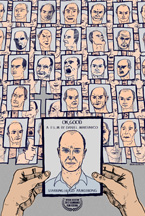 Daniel Martinico: That, yeah, I mean that’s a good question. I don’t know, but I don’t think of it differently from before. I think the work I was doing in video had an entry point as well, but that wasn’t something that was in the thinking of how it was made, or why I wanted to make it. It comes about naturally as part of the piece. Some have an easier entry point than others; in some it’s tiny and kind of hidden away. I think narrative, especially like feature or storytelling in this way, just by its nature seems to already have an entry point ‘cause people expect it to be for an audience in the sense that you can actually sit down and experience it, and they actually expect you to make that for them, I think.
Daniel Martinico: That, yeah, I mean that’s a good question. I don’t know, but I don’t think of it differently from before. I think the work I was doing in video had an entry point as well, but that wasn’t something that was in the thinking of how it was made, or why I wanted to make it. It comes about naturally as part of the piece. Some have an easier entry point than others; in some it’s tiny and kind of hidden away. I think narrative, especially like feature or storytelling in this way, just by its nature seems to already have an entry point ‘cause people expect it to be for an audience in the sense that you can actually sit down and experience it, and they actually expect you to make that for them, I think.
Frank Rinaldi: I think everything is storytelling; I think that’s embedded everywhere in our culture. I think narrative film structure is a really specific type of storytelling, and because that’s the type that has been used in the majority of the films that we see, people have mistaken that for the only kind of story, with this Aristotelian narrative structure, and I think that’s really a shame. It’s a great form and it works, but there’s room for different kinds of storytelling in film, and oftentimes there are very powerful examples of this storytelling that we find in mediums that are not necessarily cinematic—maybe they’re fine art, maybe they’re literary, maybe they’re musical, whatever, but it’s still storytelling. So we can draw on that and incorporate them into our film, and for me—I mean I think you had some really interesting things to say about making the film for yourself; for me connecting with an audience is very important, I mean that’s why we do this: I want to establish a connection with an audience; I wanna express what I have to say and I wanna hear what people have to say about it and I wanna make them feel things. I think that—and this is OK—the majority of film watchers have been conditioned to expect a particular kind of story when they watch a movie and it’s important to me to give them enough of that so that they can latch on to what they’re used to, and then not divert but maybe evolve from there, and then we can explore new modes together, you know?
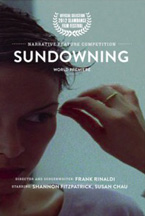 Scott Laidlaw: In storytelling I think a big thing that a lot of young filmmakers miss these days is using sound to textualize the image, and I think you guys [Peter and Brennan] did that extremely well; I think that helped it quite a bit especially in the end, and definitely in Sundowning Frank attempted and succeeded in doing the breathing sound when she’s in the elevator, and feeling like you’re closed in like you’re in an airplane with all that white noise, and then the popping of the television, and I think that helps make the story more interesting and easier to follow.
Scott Laidlaw: In storytelling I think a big thing that a lot of young filmmakers miss these days is using sound to textualize the image, and I think you guys [Peter and Brennan] did that extremely well; I think that helped it quite a bit especially in the end, and definitely in Sundowning Frank attempted and succeeded in doing the breathing sound when she’s in the elevator, and feeling like you’re closed in like you’re in an airplane with all that white noise, and then the popping of the television, and I think that helps make the story more interesting and easier to follow.
Frank Rinaldi: They’re still storytelling tools. They might be non-traditional, but they’re still serving the purpose of telling the story.
H2N: I guess then maybe in a larger sense, you were talking, both of you, about creating an entry point for audiences; at the same time I guess the reality of our culture is that the vast majority of audiences are not prepared for even that much divergence from what they expect to see in a film, so how do you think of your work in terms of—I mean there’s this kind of tragic situation of your work only being able to be seen or understood by a certain type of audience.
Frank Rinaldi: That’s where you come in, Paul. [laughs]
Peter McLarnan: I think, I mean I think all of us sitting here, we’ve made these films for starters for ourselves, so I think there is an audience for people who are trying to expand or who are interested in expansion of their structure, who are interested in expansion of storytelling styles or of an exploration of trying to find a new language or an old language or something other than the a-b-c-d-e, but I also think that it’s a choice to make films, and there’s also really just a wonderful amount of opportunity within a certain framework to do some interesting things and I think if you give a certain kind of foundation, from there you can operate really really freely. On a mass-conventional level, they nominated for best film The Tree of Life. I thought it was really really interesting narratively, and yet there it is.
Frank Rinaldi: I think it’s interesting; it’s gonna take time, you know? But when we’re making our movie in Singapore and we’re feeling like maybe we’re the only ones doing this, and then we get a call from Slamdance and they say we love your film, come. And then we come to Slamdance and we find three other people or four other people who are doing this and it’s like, “OK maybe we are doing something right.” And now you’ve got a body of work that’s kind of doing the same thing, and audiences start to recognize patterns; you, Paul, start to recognize patterns and we start discussing it, and slowly but surely it becomes more and more of an accepted form. You know, if it’s radical at first—people don’t immediately adjust to radical ideas; it takes time to engender themselves to these ideas, so hopefully we can just keep plugging away, and they’ll come around.
Daniel Martinico: I mean I think that—I don’t know, as a consumer of movies and of art, I totally appreciate stuff that’s really accessible and entertaining, but a lot of what I consume is actually really difficult and would turn most people off. I was having a conversation with [Slamdance Programmer] Josh Mandel last night about Jeanne Dielman, and most people would run screaming from that film, and then there are people that it’s almost like a religious experience. And so if I’m thinking of an audience, I’m not concerned about a certain amount of accessibility because I know there are people like me out there—I mean there’s tons of them, they’re at this festival, people you talk to, who are cinephiles—they are looking at films and loving films that are not necessarily easy. And so those are the people that we hope will kind of find their way to the work, and find their way in, and if people can’t find the access point that’s OK too. We had several folks walk out of our first screening, and that made sense to us. We really expected that there would be people who it just would not in any way vibe with. And in fact if that wasn’t happening I’d think that maybe we weren’t doing it right. Because again when we talk about making it for ourselves it’s also making it for people that are in your world of sensibilities, so it’s not like a selfish act—it’s just an act of self-selecting people who are similar in their interests.
Frank Rinaldi: It’s disappointing to me though, the walk-outs, because I feel like that’s kind of a cop-out. I mean whether or not you like something the very least you can do is engage with it, right? I feel like that’s not asking too much, I mean if you hated something but you’re able to support that opinion with informed ideas that’s fine. I don’t care if you hate my movie—I mean I do care if you hate my movie, but I respect your opinion, but you know if you’re just gonna toss this off and walk out of the theater, that’s just so frustrating. That is what bothers me. I don’t mind divisive opinions; I just don’t like uninformed, easy opinions, negative opinions.
Peter McLarnan: I think that’s such a huge part of it—it’s maybe like experienced so passively, you know, the act of watching a film—it’s maybe the easiest to be a disengaged audience member. Like just sitting in a theater, you can just glaze over, you’re in a dark area, you’re totally safe, right? And so you don’t have to do anything, and I think it’s nice to think about trying to like reach out and establish a connection with people where it’s OK for them to work a little bit. I mean films and novels are entirely different but you have to work to read a book and you have to work to listen to an album sometimes, to really experience it, and in a gallery setting you have to be patient a little bit, and I think that there’s some exciting opportunities to re-establish a relationship between film and viewer, that it’s an active relationship that requires some patience and some work.
Frank Rinaldi: Audiences are becoming more and more sophisticated, so I think there’s ample opportunity to ask them to work. I mean it’s kind of a double-edged sword because we consume so much media, so on the one hand we become very fluent consumers but then on the other hand it becomes tiresome because we’re nearly never asked to work, so it could be that once in a while as consumers when we are asked to work perhaps that’s refreshing and stimulating.
H2N: In that sense I wonder what you think in terms of the particular times we’re living in, in terms of the explosion of technologies for communication. Like when I think back on other eras, in the 1960s you saw avant-gardes whose ideas and esthetics reverberated fairly quickly out into the larger population and it almost seems like even though we have more access to different kinds of cultural expressions they’re much more drowned out by the sheer quantity of things you can consume with your senses. Do you think there’s the same possibility of works like yours to have an effect in the sense of making it outside of these rarified circles?
Frank Rinaldi: Yeah, I think that while there’s a lot more opportunity it’s like in a sense, when it comes to generating media content, technology has really democratized that, right? So there’s a lot more out there, and it’s scattered all over the place. I think that despite the fact that technology has really transformed our lives and really changed our relationship to physical distance, one of the interesting things, when you’re referencing the avant-gardists and the new wave filmmakers in the ‘60s, is that they were still getting together physically, and all showing their movies, and all sharing their work at the same time, and that was like a physical community, and I think that perhaps that is more important than ever in today’s hyper-technological age, and maybe that’s what it’s gonna take to be able to rise above the noise, right?
Scott Laidlaw: I think that back before the internet existed and back before we had computers, reading and going to movies was an extremely important thing for people to be entertained, so I think that when you move forward to the present where everything seems to be oversaturated by YouTube and things like that it’s like the same thing as the dime store novel or pulp fiction, it’s just taking a different form. And we’re still in that era that’s trying to figure out what it is and where it stands in our society. So to have these films here and have people come out and see them, yeah, I think we are gaining more of a sophisticated audience.
Peter McLarnan: I do think that the physical space and the in-person experience is really the answer. Especially in the home, for me, I can’t really be active as a viewer; that doesn’t work for me. I have to go to the things. And I think that that’s an experience that people are excited about. Like, touring independent bands are doing better than ever. Despite the availability of all this music online for free, people are going to shows and that’s how these bands are making their living—they’re playing in physical spaces and they’re creating relationships with their audiences and they’re part of something bigger. And I can see that happening with independent film or films that don’t fit into a conventional theatrical setting. Think of them as rock shows, you know, setting up venues where they can be experienced by an audience who’s curious.
Frank Rinaldi: And I wonder if we crave that human connection now more than ever because we are more than ever isolated by the machines that we’re using.
Peter McLarnan: And we all have this nostalgia for these moments that we missed, where there was this, you know, I was too young for like the first big punk explosion and I feel like I missed that. Or these sort of cultural moments where things come together.
Frank Rinaldi: Which is informed by our access to technology, like it’s been documented—we see it all on YouTube—“man that looks so great; I want a community like that.”
H2N: That’s an interesting point too—on the one hand people are going to shows more, but I mean certainly people are consuming media in a different way than they ever have before and even the whole experience of being on Facebook and having a virtual self, and having a “these brands define me” kind of thing, do you think that that can fundamentally change our consciousness or are we ultimately the same animal that we’ve always been?
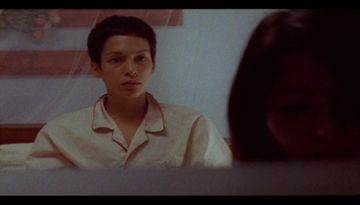 Frank Rinaldi: That’s a really good question; that’s something that Jon Rafman addresses a lot; I think he’s of the mindset that it’s an expression of the self or a particular iteration or extension of the self. There’s this thinker named Jeron Lanier that I like, and he seems to think that it’s probably safe and healthy for people who are of a particular age, like they get access to Facebook by the time they’re in their early adulthoods and they’re able to distinguish their selves from their internet presences, but his fear is that when you get the younger generations getting to this media, this content, at an earlier age, they fuse their selves with their online identity and it’s a really reductive self and he thinks that that’s maybe unhealthy. And he could be right, I don’t know.
Frank Rinaldi: That’s a really good question; that’s something that Jon Rafman addresses a lot; I think he’s of the mindset that it’s an expression of the self or a particular iteration or extension of the self. There’s this thinker named Jeron Lanier that I like, and he seems to think that it’s probably safe and healthy for people who are of a particular age, like they get access to Facebook by the time they’re in their early adulthoods and they’re able to distinguish their selves from their internet presences, but his fear is that when you get the younger generations getting to this media, this content, at an earlier age, they fuse their selves with their online identity and it’s a really reductive self and he thinks that that’s maybe unhealthy. And he could be right, I don’t know.
H2N: In that sense do you think that making a 90-minute film is becoming like a curious niche, or does it still have an important impact on the culture in general?
Scott Laidlaw: One of the things that I don’t feel that I should have to do is to post things on the Internet so people can see them. I don’t feel that I should do that to make it more accessible. Because it’s—I don’t see as insulting someone asking me “why don’t you put it on the internet so we can see it?”—because they wanna see it. But at the same point it’s like well why don’t you come out and see it?
Daniel Martinico: I see my film as really existing in a tradition that has been happening for many many years, and it’s just kind of spinning on that and kinda tweaking that in ways that are really personal to myself and to Hugo, but I don’t see this film as breaking any kind of cinematic boundaries; in fact, like you’re saying, the narrative feature film is actually kind of an old-school way to work now, and I think that’s gonna become more and more so. The democratization of technology means that anyone can do it now, so it’s not as special as it used to be; we’re already seeing this flood of people making these films—it’s not special anymore; it’s not new. I mean, it’s still what you do with it, but I think we’re actually operating in an antiquated or soon to be antiquated tradition.
Frank Rinaldi: You know, I’m gonna have to respectfully disagree with you, but I think it’s really interesting and you got me thinking, thank you for leading me to this idea. I think that it’s expanding at the same time that it’s contracting. So perhaps the old model of narrative filmmaking has become an outmoded niche. But at the same time, the things that are being accepted into the Slamdance narrative feature category are films that may not necessarily have been considered exclusively narrative 10 or 15 years ago, right? So it’s like if this need, or this space of narrative filmmaking is contracting, the ideas that make up narrative filmmaking are expanding, right? And hopefully it’s balancing itself out. I think it is. I think it’s got that potential.
H2N: In a sense, to agree with both of you, we haven’t strayed that far from the kind of Greek tragedies that were performed 3,000 years ago, so I think everything since then has its own importance pertaining to the time when it was created. But then I also wonder, you know, what rank it has in people’s consumption of media. And what about the idea that a powerful piece of art has an inherent value in and of itself? That even if nobody sees it, it still has power and value?
Brennan Vance: I was recently reading an interview with Tarkovsky and I have two things to say relating to this discussion. He was recounting a tale when he was trying to pitch Solaris to Mosfilm and he said, “You’re gonna have this 45-minute sequence on Earth before the story actually begins,” and they said, “Absolutely not; people are gonna walk out.” And he said, “Let them walk out—I think we should make it even longer, to induce people who are gonna walk out, to walk out so then we can actually have a pure experience after that.” And what he did in most of his films, is he tried as hard as he could to reject modernism, and he would use classical music, he would always put in like Tolstoy’s statues; someone would always be leafing through some beautiful book of, like, Brueghel the Elder. And that conviction of this timeless connection with expression, with humanity, with eternal questions about who we are and what we’re doing—all those essential life tales that we need to tell as filmmakers—I think he’s an incredible example of how to not be taken away by the stream of modernity.
Frank Rinaldi: Yeah, he was a great contextualist, like everything you’re describing, like maybe he was pushing in new directions but he was establishing a context, right? And people were, “Oh I recognize that, oh I recognize that, oh I recognize that.” That’s when history is important.
Brennan Vance: And Frank you mentioned this really well before, of appreciating and championing these things that we love about art that we’ve experienced ourselves and wanting to re-create the experience, but also allowing a small bit of evolution into that.
Frank Rinaldi: Because it’s a living thing—it’s gotta evolve, right?
H2N: I mean to me these kind of films again, you know, regardless of how popular or profitable they are, they have a function—they bring a sort of health to our society, because they’re actually critiquing, or putting things into a different perspective, or taking a long view of how we’re living, what’s in people’s hearts.
Frank Rinaldi: You can argue that everything else besides art is a distraction, as far as we’re concerned, right? And it’s getting us to take a step back and recognize that and realize that, and that is healthy—otherwise we’re in trouble.
Hugo Armstrong: I’m really interested in everything that we’re saying, and there’s something that we cannot really describe in words or describe to each other through any means other than hopefully what we’ve done, and it’s part of the human experience that we’ve constantly been in search of, for a long long long time, and speaking about film specifically, when you see a movie there’s something at its best that’s happening to your body; there’s something that’s happening to you as a human being that opens you up, or closes you down or twists you in a certain way or does something to you that you can’t describe other than to say to your friend “you should check this out.” And “I don’t know exactly what happened to me, or why I dig this, but I’ve been stretched.” And speaking of art, I think that’s why people look at paintings, and look at sculpture, and go to these shows, or move a rock in the middle of the desert and don’t tell anyone and that’s the thing that they did. They do it because there’s something inside of them and inside of everybody that we cannot quite fathom, that is beautifully beyond our sense of reason. And when we have these experiences, especially together, it can be a really powerful thing.
Frank Rinaldi: That was great, that was really powerful, and it’s like OK, filmmaking is the result of an industrialized age, right? Which is an example of explosion in technology and yet it’s allowed us to get ourselves back in touch with a language that’s a pre-verbal language so in a sense it’s almost entirely sensorial and it’s hitting us not only in those parts of our brains that help us organize things and anticipate things and stuff like that, but it’s also hitting us in that reptilian layer of our brain, right? Things that are going on in there that we don’t have the language to be able to express, but we do have the ability to feel, so it’s this explosion in technology that in a sense can help us return to these strange roots, and this is something that’s happened, and I’d like to think that as we move into the next technological epoch, hopefully there’s even more opportunity to use the technology that we have in our hands to drill deeper into the brain and drill deeper into the human soul, you know?
H2N: Another question occurred to me, and I guess this is a complete non-sequitur—but it’s something I think a lot about as a film programmer. How do you measure the inherent value of a film, like when we’re making a decision that “OK these are the ten best films out of this pile.” I read Salvador Dali’s biography and he listed the top ten artists of all time, and he was like number seven, but I mean, maybe this is a really stupid question, but do you think that art has a not necessarily measurable, but an inherent quality outside of each of our subjective judgments of it, like if we were God we could say this is a better piece of art than that?
Scott Laidlaw: Before we came out here I was talking to Frank about how I’d just watched Gattaca on Blu-ray, and you know how like, I saw it when I was a lot younger, and he asked me if I thought it held up, and honestly it didn’t really hold up as much as I had wished it would. I think over time opinions can change, so that’s why I don’t think you can honestly say that maybe one thing is better than the other.
Frank Rinaldi: In terms of emotional content, I think it probably is a subjective measure, however I do believe in the value of rigor and technique and I think that these are measurable quantities. You can tell how rigorously someone researched something, how hard they worked on it, how much thought they put into the design, and these are like prerequisites for us to be able to take the emotions seriously, you know?
H2N: But you’re talking in terms of the effort that was put into the film, but I would argue that probably the inspiration that might not even have anything to do with your effort or your rigor, is maybe a more important factor in the quality of a film.
Frank Rinaldi: I agree, but I think that inspiration drives us to be rigorous, right? So it’s like the larger the inspiration the harder we’re gonna work and the more we just absolutely have to do it, you know. But I could be totally—because I’m expressing my opinion I realize that I’m actually just undercutting my opinion, because it’s only my opinion. But I think inspiration fuels effort, right?
Brennan Vance: For me as a viewer, I think these elements of cinema that you’re talking about—research, technique, and even down to what F-stop you’re using on a certain shot—these are ways that I can trust a narrative, like do I believe that what these people are trying to share with me is legitimate? Have they put their heart and soul into it? And if I feel like they have in one way or another then I can access it wholeheartedly.
Peter McLarnan: And really I think it goes even beyond those judgment qualities; I think for me the best kind of films are like a perfect temperature lake water that you sort of just get to swim in, and the shots, and the technique and all that stuff for me is just like setting the right temperature for the bath that you’re gonna take, so there isn’t that extra five degrees colder or five degrees hotter that makes you uncomfortable and takes you out of that place where you’re just kind of floating through it, and I think that’s why it’s so important to build the space, because really you’re just kind of drawing a bath.
H2N: And you as a director, how do you create that?
Peter McLarnan: I think for me it’s about duration, and I was really fortunate enough to be working with Brennan who I think is just such a fantastic photographer, so it’s about duration and a certain—cleanness?—or a certain… it’s hard to describe for me without using analogies, so it’ s tricky.
Frank Rinaldi: Speaking specifically of The Sound of Small Things, I understand that, and I see you describing your technique and that’s your signature, but what you’re unleashing is a kind of emotion that I felt to be very universal—it really connected with me, right? So it’s like you’re twisting the faucet this way, and you’re filling the water this high—these are your tools, this is your technique, but you know you’re trying to create the perfect bath, and then you let me get in your bath, thank you very much [all laugh], and I’m like I don’t know how he made this bath, but I know he worked really hard on it because it feels perfect to me.
Peter McLarnan: Right, right so it’s really a feeling right?
Daniel Martinico: This is sort of back a bit but just in terms of rigor I think sometimes a piece that may really speak to me actually might just be a simple, raw gesture. I mean that doesn’t always translate in art for me. As Hugo said, the idea of someone picking up a rock and moving it in the desert—something like that can be very beautiful and it doesn’t require craft or rigor to do. Now, translating that to feature films, I think that’s maybe where it’s different because it’s harder maybe to sustain 90 minutes with somebody who isn’t practicing at a certain level of the craft, but I’m not even sure that that’s true, because some of the stuff that I see that I really love is coming from, in terms of the craft, a very raw and non-sophisticated place—and yet there’s stuff in the film that transcends that and moves me, or speaks to me, so I don’t know.
H2N: Like The Room, for example.
Frank Rinaldi: But the shame about The Room is that he’s, like, backtracked on it. I mean it’s obvious that he was so passionate about making it and now everyone’s like, “Oh look at this campy movie,” and he’s like, “Yes I intended to make a comedy.” No you didn’t, but it’s fine that you didn’t. But the thing that you were talking about—moving the rock, or a really powerful gesture, or whatever—I mean that makes me ask then what is art, because it could be the rigor might not necessarily externalize itself but it could be going on in your head, and it doesn’t necessarily need to be in the form of an organized language, it could be like these very abstract albeit rigorous thoughts—is that what distinguishes art from a form of human expression? Intention can take many forms, and I think intention is vital to art and I think that’s what distinguishes art from a random act of expression. And I think intention requires rigor, but that can be abstract, or that can be lingual, or physical—like, talk about Marina Abramovic, or Matthew Barney—these are very primal performance pieces that don’t—well no actually they do require a lot of thought, but at the same time it’s very rigorous, it’s enormously rigorous. “I’m gonna put myself on a block of ice for 24 hours”—that’s rigorous, yeah.
H2N: OK, to wrap things up, I’d just like to ask you all—and maybe this is another stupid question, but I’ve seen or I think I’ve seen a sort of trend or a kind of collective area of exploration happening here at the festival, and I wonder, for each of you, since you are all trying to expand the boundaries, challenge yourselves, challenge what’s being done—how do you plan on taking things further?
Frank Rinaldi: I just wanna say I think you’re a collaborator—I mean you’re saying, “I identify these disparate films,” and you’re recognizing thematic similarities, common voices, and you’re bringing it all together, so you’re, I think that you’re a collaborator in that process. How to keep pushing it? I don’t know, just keep refining—I think we did a really good job of articulating our ideas about filmmaking and art, and, you know, each of us, this is our first feature film, and I love my movie, I love our movie, but I still think there are a lot of clumsy things in there, and I just hope to keep refining that, capturing maybe something of what people appreciate about our film, but unleashing it in a more sophisticated and powerful way, right?
Peter McLarnan: Yeah, you learn so much through this experience—having never really explored this territory as thoroughly as we were able to do with this film, you learn a lot and hopefully you don’t learn too much. I guess that’s maybe part of it.
Daniel Martinico: I guess it just seems like simultaneously a continuation and a starting place.
Scott Laidlaw: It’s not a bad thing to struggle—so hopefully we keep struggling and get things made and hopefully people can come out and struggle with us I guess.
Brennan Vance: Yeah, I think the question is kinda like asking how do you plan to grow up, and I think none of us would be artists if we weren’t creating challenges, if we weren’t expecting challenges, if we weren’t expecting to be proven wrong, or guided in a different way. I know exactly what kind of film I wanna make, the next one, and I hope that’s not actually what I do, that it evolves and becomes something better and kind of outside of myself, that teaches me and hopefully facilitates that in others.
Hugo Armstrong: I don’t know how it’s supposed to move forward or anything like that, but I know that inherently we’re really involved in kind of a—going into a darkened theater and looking at these things, I know we’re involved in a pretty heavy kind of ritual that provides some kind of conduit to The Other, in a way that, you know, hopefully we can stay as true as we can to the thing that we felt to begin with. And if you stay true to that, then you’re actually communicating in a way that’s indescribable, and extremely cool. And I think it’s also important to have fun.
— Paul Sbrizzi







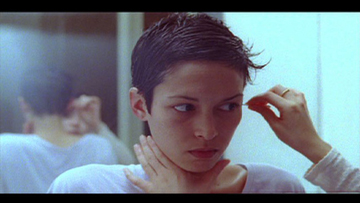
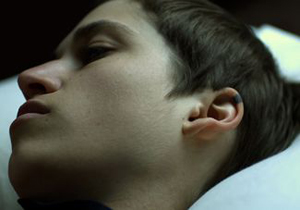
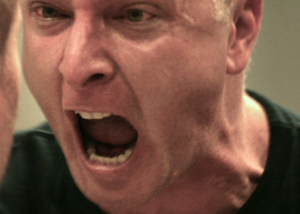
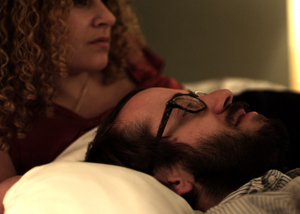
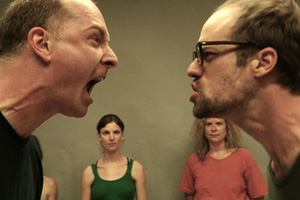
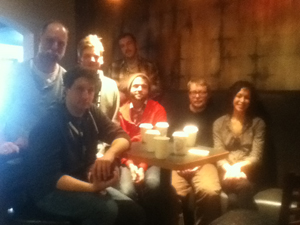


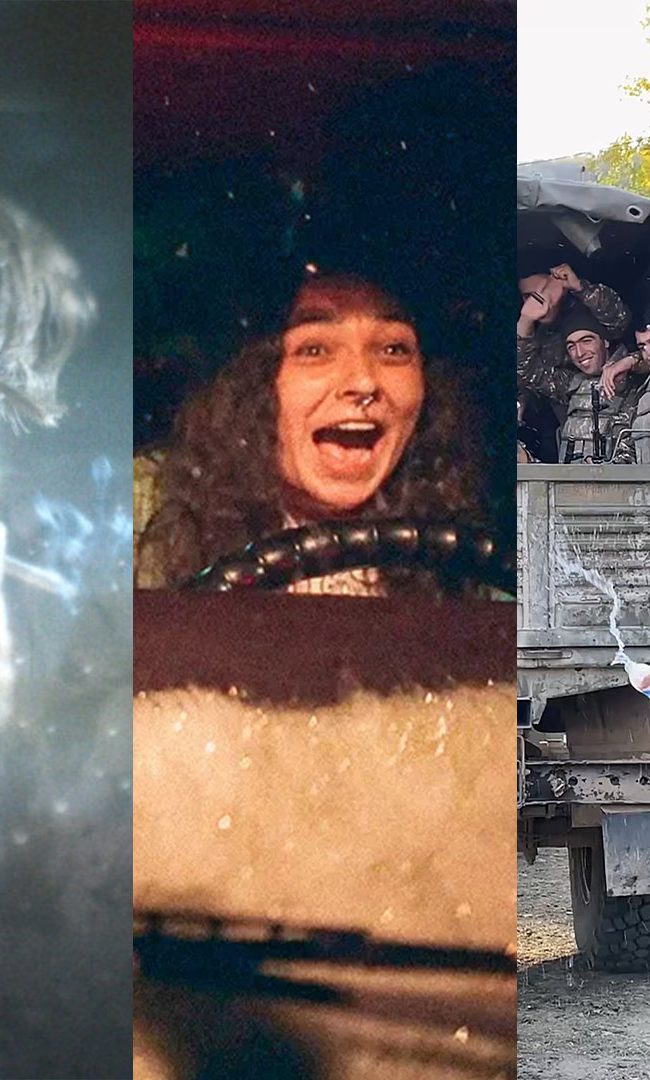


ZEK LIGHTNING
MY REVIEW OF OK.GOOD. BY DAN MARTINICO;
There aren’t a lot of words, but there’s a great monologue written by Oliver Stone at the end of the film.
That is to say they stole an entire monologue from “Conan the barbarian” and used it without Oliver Stone’s permission in the guise of being pop-culturally ironic.
The problem with that is that its 2012 and pulp fiction was a hell of a long time ago.
They’re still getting away with the use of a great monologue they can’t really take any credit for.
These people threatened to have my neck broken and everyone in my family killed.
I live in a country where I have no rights and major news networks run ads for the well known cults.
I’m defending my life by making it public that Hugo Armstrong threatened to have my neck broken and everyone in my family killed.
(It’s not easy getting through to the mainstream media,let me tell you.)
I challenge any, cult-member, Hugo Armstrong, Dan Martinico, or anyone involved to come and make their case against me in the court of public opinion.
I don’t need the mainstream media.
These people made a film.
I’ve known Hugo Armstrong since 1995.
I’m an actor myself.
I did a great job even though I was being put through a (well known cult) drill disguised as a film shoot.
Martinico and Armstrong construct one mostly wordless chunk of waste after another because neither of them can write their way out of a wet paper bag.
The concept for this film was stolen from me in 2 ways.
firstly:
Before inviting me to work on a short film called “bike thief”, Armstrong and Martinco told me that they were interested in making a film that I was currently writing called “entrance to Elsinore.” about a Tom Cruise inspired character named Paul Roam.
The story revolved around his public meltdown, the spectacular revelation of what his cult really is, and just how powerful and insane they are.
It was a far more ambitious and beautiful film than this very small wordless bike thief re-make we have here.
Zek Lightning was Hugo Armstrong’s roommate at the California institute of the arts and the two had been close friends ever since.
The truly diabolical irony of okay.good, Is that Armstrong and Martinico are both involved with cult activity themselves.
-and bike thief wasn’t actually a film.
It was a drill,exactly like the “cultish movement workshop” this character also named “Paul” experiences.
On the set of bike thief, Armstrong threatened to have my neck broken and everyone in my family killed because I’d been trying to blow the whistle on at least one of the mafia like cults that both Armstrong and Martinico are members of.
Okay good is part rip off of:
“entrance to Elsinore”
-in which a mega-star is turned into an unknown actor who’s cult induced freak-out is far less grand and spectacular than the vision Zek Lightning (Me.) had to tell a real story.
Secondly,
The rest of Okay.Good. is their attempt to explain away what they did to me on the set of bike thief and to imply that I went crazy during their “cultish movement workshop”,which was actually the filming of “bike thief.”
Cults operate covertly.
They can’t ask a non-member to participate in a drill, so they invite him to work on a film shoot that actually is a drill.
Hugo Armstrong attempted to cover his tracks by sending a thank you gift for participating in a “survival camp” set to film.
The point of the film was to subject me to a (well known cult) drill, and threaten my life in an environment where any attempt to contact the authorities would’ve led to me being arrested or diagnosed with a non-existent mental illness.
There was a police officer named Luke who came to see what was going on during the bike thief filming.
We were in mount Washington park near the home of then Mmyor, Antonio Villaragosa.
There are times when all you have is a right to free speech and all 26 letters of the alphabet.
Dan Martinico and Hugo Armstrong threatened to have my neck broken and everyone in my family killed on the set of a short film called bike thief.
They just released a feature half based on this (well known cult) drill disguised as a film shoot,and a concept entirely stolen from me about a character based on Tom Cruise.
They began to harass me not too long after I wrote the first scene.
Hugo Armstrong and Dan Martinico invited me to begin bike thief shortly before my first trip to the emergency room in 2005.
I once witnessed a man in a night robe trying to escape from the (well known cult) celebrity center on tamarind and franklin in Hollywood.
I Am Zek Lightning
TO DAN MARTINICO:
YOU’RE TRYING DESPERATELY TO COVER UP THE EVIDENCE OF YOU AND HUGO, BASICALLY ADMITTING THAT I AM BETTER THAN YOU,..WHILE GETTING CAUGHT TRYING TO SUCK MY DICK WHILE I’M ASLEEP. OK.GOOD. ..my ass. THESE 2 ARE COWARDS AND THE SILENCE IS DEAFENING